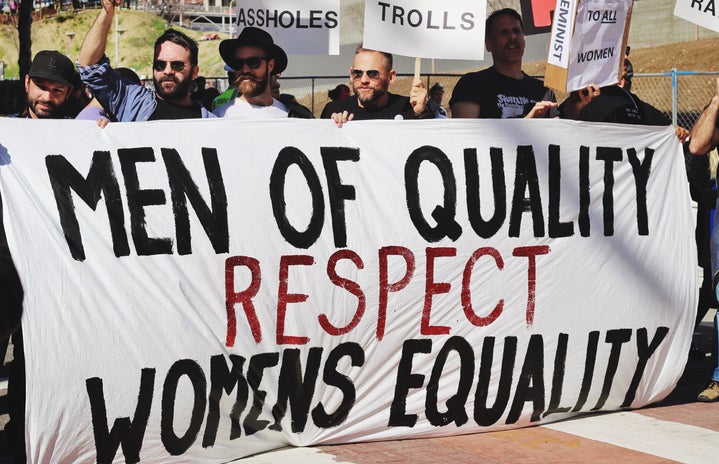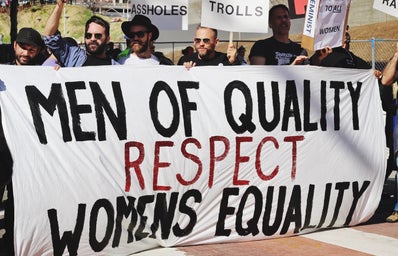Thank you to the U.S. government for showing us that we still live in a patriarchy.
I’m usually not a very political person. However, the recent news regarding abortion laws has spread like wildfire across social media, and to me, it raises several concerns. I could talk about the dangers of this specific decision in both the legal and social sense and how outrageous it is, but instead, I’d like to focus on what I see as the bigger picture. When will people gain full autonomy over their bodies and lives? Will it ever happen? Are we going to have to act according to the actions and decisions of cisgender men forever? It simply doesn’t seem fair.
With the Supreme Court voting to strike down Roe v. Wade, the 1973 decision that guaranteed federal protection of abortion rights, the right to choose for American women is in danger. The draft of a Supreme Court majority opinion leaked by Politico on May 2 states: “We hold that Roe and Casey must be overruled. It is time to heed the Constitution and return the issue of abortion to the people’s elected representatives.” There’s something almost comical about how this decision was made, as it was formed by a group of cisgender men who need not worry about childbirth.
We’ve come a long way from when women were expected to be submissive, stay in the household, sit still and look pretty. That, however, doesn’t mean that those times are completely in the past — it’s scary to think that some people still show a sexist attitude towards women, but sometimes the truth can be terrifying. But that’s not even the scariest part — sometimes, these beliefs are held by the people close to us, people we trusted and would have never expected to have such misogynistic views.
I think the first time I realized that this type of thinking was prevalent was the summer when I was in limbo between a high school senior and a college freshman. I met with a friend I hadn’t heard from in a while because of COVID-19 and partially because we had drifted apart a bit. The conversation naturally led to our classmates in high school, and we started talking about a guy we both knew. I mentioned that he didn’t seem to like me very much for some odd reason, and she told me that one day in senior year, he asked her to study together for an AP class.
While studying, he suddenly asked: “Are you friends with Grace?” Furrowing her eyebrows, my friend answered that she was, wondering why, all of a sudden, he brought me up. Boldly, he said that he doesn’t like me very much.
Confused, my friend asked him why he was telling her this, to which he responded, “Oh, I just thought you should know,” as if he knew something about me she didn’t, something that would change her opinion on me. Up to this point in the story, I was confused why he was suddenly talking about me, and I wasn’t even angry, just mildly annoyed that he was expressing some sort of unexplained hatred towards me. But his next words made me question every positive impression I had of him:
“When I talk to her, I don’t dare to look down because all I can see are her boobs,” he said. “She wears so much makeup and tries so hard with what she wears every day at school. Is she trying to impress other guys who aren’t her boyfriend?”
Appalled isn’t even strong enough of a word to describe how I felt — no, how I feel. I never imagined something like this would come from someone I knew. This was something I always thought I’d see on the internet, get angry at, then forget about. But now, this is something that someone I knew said about me, someone I had a good impression about. I didn’t know how to react — I didn’t know how I was supposed to react. I never asked him to look, and I didn’t put effort into my appearance to impress guys, certainly not him (and to this day, I still wonder why he thought eyebrows and mascara was “so much makeup”).
I didn’t know what to do with the realization that despite the rise of feminism, the world we live in is still incredibly sexist. I got dress-coded for wearing a cropped long-sleeve shirt to a casual school dance; another girl got dress-coded for wearing ripped jeans. When have we ever seen a guy get dress-coded? Why are we forced to go home and change simply because some guys can’t control themselves? Why are we the ones to blame for something that isn’t our fault? Should I be angry at this apparent inequality, or should I be thankful that I don’t go to school in Japan, where girls aren’t allowed to tie their hair into a ponytail because the backs of their necks are “too distracting” for guys?
Every time I hear someone say “women belong in the household” or “it’s a woman’s duty to obey their husband,” I die a little inside. I often wonder why when a woman gets married, the father walks her down the aisle and hands her off to her husband. If it’s symbolism for independence, then why do husbands not have to do the same? Are we still seen as property, and is this just a ceremony that symbolizes a transfer of ownership?
The experiences I hear from my friends terrify me even more. One of them had a guy tell her that finance was too hard for her to study and that “girls don’t need to do something so difficult.” Another confronted her boyfriend about how he cheated on her, and he said, “cheating is a privilege only owned by men; women aren’t allowed to cheat.” Her boyfriend was someone I’ve known since middle school. Never did I expect him to say something like this or “I feel like it’s a loss that I dated you because you weren’t a virgin” to his girlfriend of two years. And of course, I’ve seen an endless amount of objectification and sexism online, from “if she covered up, she wouldn’t have been raped” to “if women don’t have children, their lives are incomplete.” I wonder when all of this will end and if there will ever come a time when women are truly equal to men.
It baffles and angers me that these things are happening to everyone around me as well. There seems not to be an end to these close encounters with misogyny. After all, it’s more common than you’d think.


